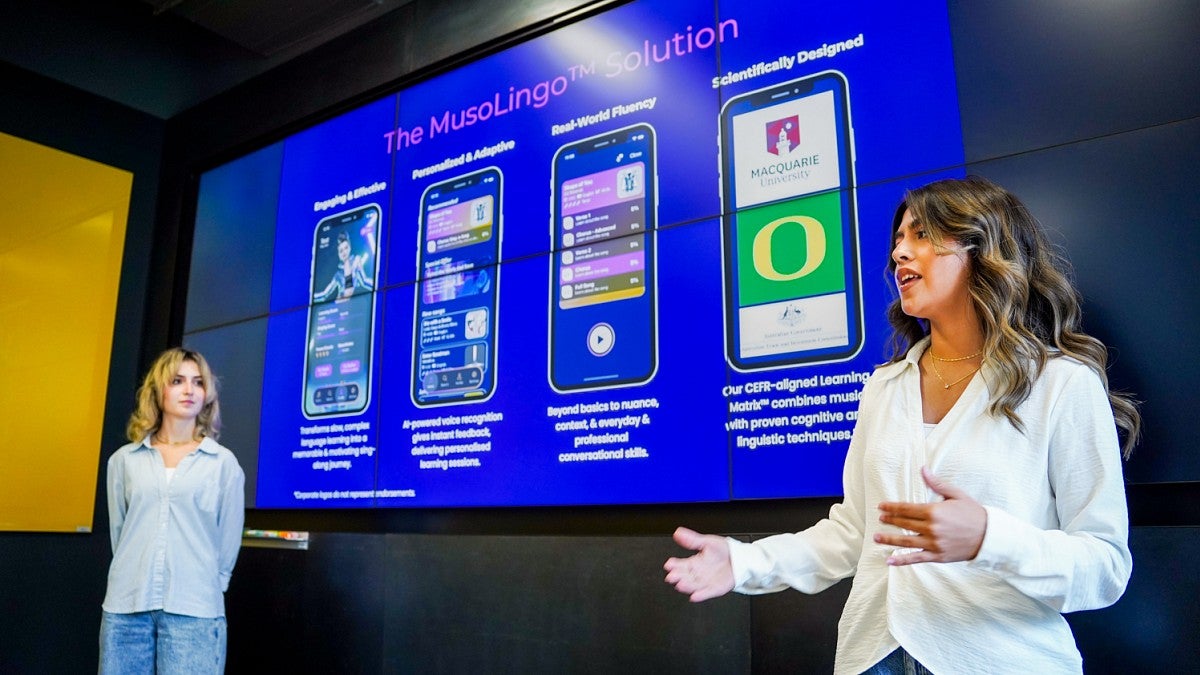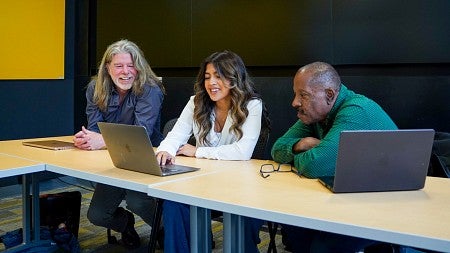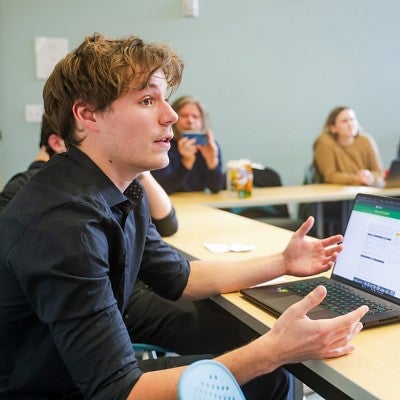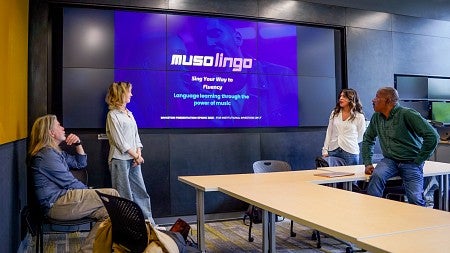The SOJC project is a paid internship that prepares students to enter the job market with the skills and experience to assess and solve problems.

by Ethan Donahue, Class of ’26
The SOJC Media Innovation Lab is not your average college internship experience. Based in Allen Hall, the lab pairs students with nascent companies looking for help with app development, design, social media and marketing research. Often, students who complete the internship go straight into a job after they graduate.
Take advertising major Audrey Estrada, for example. She led a student team that worked with client MusoLingo to make improvements to the company’s language-learning app. After graduation this month, she has a job set up to assemble a U.S. team to work on MusoLingo.
The co-creators of the lab, SOJC Associate Professor Ed Madison and entrepreneur-in-residence Chris Adams, aim to give students like Estrada the space to grow and experience real-world projects within the safety of a mentored environment. The welcoming statement on the lab’s website sums up their intent: “We are disruptors, problem solvers, builders and changemakers who question conventions, embrace uncertainty and invent what’s next and new.”
SOJC lab is based on the MIT model
Madison got the idea for the internship after visiting the MIT Media Lab, which supports promising young innovators as they discover solutions and solve problems. In the MIT model, industry clients pay a subscription fee in exchange for access to research, strategic intellectual property opportunities and a network of industry innovators.
“The MIT Media Lab is world-renowned,” Madison said. “A lot of technology that we have in our pockets and in our homes was developed there.”

Preparing students to solve problems
Madison knew he wanted to create a similar structure at the SOJC, but he needed a partner with experience in the industry. He had heard about Adams from a friend and was impressed with his work. A chief vision officer for eBay co-founder Jeff Skoll's Participant Media, Adams led the fledgling movie studio in producing iconic Oscar-nominated and winning films, including “Good Night, and Good Luck,” “Syriana” and “An Inconvenient Truth.”
Both Madison and Adams shared a desire to engage young people in media projects to prepare them to assess and support solving media industry problems. Many producers in the industry see Gen Z as consumers rather than creators. Having a student-based lab would develop Gen Z voices and skills and give them a role in product creation.
The lab itself is a cross-disciplinary paid internship where students work with companies to address questions or issues they face. It began as an extracurricular program in winter 2023 and shifted to what Adams described as an “internship factory” by fall 2024. Madison and Adams match paying clients to student teams. In the process, students get a crash course in everything from presenting pitch decks to analysing product-market fit.
How the Media Innovation Lab got its start
In winter 2023, Madison and Adams presented half a dozen SOJC classrooms with an enticing offer: Show up at 10 a.m. on Fridays, no credit, no guarantees — just a chance to be a part of inventing something new. Roughly 25 students arrived, and 10 weeks later, that cohort created and pitched Focal, a mobile local news app, to executives at Gannett, the nation’s largest newspaper company.
The following term, spring 2023, the lab developed and pitched a sports channel concept to Nike executives. During the 2023-24 academic year, the lab also created Unify, an AI-powered student advisor aimed at streamlining academic advising resources for students. The student creators presented pitch decks to UO President Karl Scholz and staff from the Office of Student Services and Enrollment Management.
This year’s projects run on professional sprint cycles — a 10-week period filled with WIP (work in progress) meetings, deliverables, hard deadlines and real-world experiences. Madison and Adams consider themselves guides.

“In a lot of ways, we work for the students,” Adams said. “We’re here to say, ‘It’s your job. Your ass is on the line. Let us help you and let us support you.’ ”
This led to the lab partnering with Enliven Advisory and its Digital Team (led by Mushroom Media), which allows the students to operate at the center of any project with professional and experienced team members from Enliven.
Students help improve MusoLingo app
MusoLingo became a foundation client after founder and CEO Nicole Salisbury met with Adams and was intrigued by the idea of using student innovators to improve her product. Salisbury was in the early stages of developing the company’s app, evaluating MusoLingo’s consumer base and researching best practices related to language learning. Bringing in the students helped her develop elements of her product.
“The app’s look and feel is all the students’ work,” Salisbury said. “They’re also helping us with research by putting out questionnaires and talking to people. They’ve spent the last term compiling a white paper around the cognitive and motivational benefits of using music for language learning.” One recommendation was a Shazam-style plug-in.
The MusoLingo app is set to go live in October 2025, and after she graduates, Estrada will join the company.
Salisbury said the students in the Media Innovation Lab are getting experience turning an idea into a finished product, which will give them an advantage when they enter the workforce. “The team is led by Ed and Chris, but they give students the freedom to be able to do this themselves,” she said. “That’s not something most students get to do. That’s a really special thing.”
Estrada, a senior advertising major and minor in Latinx studies, remembers the day Madison came to her class to talk about the lab during the winter term of 2023. She emailed him immediately, she said, and by that Friday, she was a member of the lab.
“It started with Chris and Ed sitting us down and asking, ‘What do you want to innovate?’ ” Estrada said. “So we tried to innovate AI.”
That innovation led to the development of Unify, the student advising app, for which Estrada serves as the chief operating officer.
Her experience working on her own startup was what led Chris to reach out to her about working as a team lead for MusoLingo. For that project, she managed five interns who developed a market analysis and marketing materials, including MusoLingo’s brand tone of voice and smaller niche elements that would make the company stand out.

Isa Morton, a public relations major and art history minor, joined the lab at the same time as Estrada. She is now the student team leader and also helped create Unify.
“I had just changed my major to PR and was feeling completely out of my depth and really desperate to make connections and figure out where I wanted to be,” Morton said. “So when Ed Madison pitched the lab to my class, I thought, ‘You know, this could be something.’ I needed the lab in order to find myself.”
Morton, also graduating this year, is interning with Mushroom Media, a UO alum-led company that works with the lab to facilitate logistics. She’s currently working on the company’s business development and marketing plans and hopes to continue working there after graduating.
“When I first started pitching (for the lab), I was doing these high-pressure, high-stress pitches,” Morton said. “I remember going into my first ones literally shaking and afraid and not feeling confident. Now I’m leaving this lab feeling so confident in talking to clients and doing the work. I feel like I can lead a team because I know what I’m doing.”
The lab recruits on a rolling basis and welcomes students from all majors — both within the SOJC and beyond it. Prospective interns can start by emailing madison2@uoregon.edu or contacting Morton at bmorton4@uoregon.edu. The lab’s students lead interviews with prospective interns, and successful applicants are slotted into 10-week, or possibly longer, engagements. Students should not put off applying due to a lack of experience or their year at UO. All are welcome, and students will receive the support, training and guidance they need to excel.
Estrada and Morton are now working on an apprenticeship program that aims to bring more people into the lab. “You don’t have to be an expert,” Morton said. “You don’t necessarily have to know what you’re doing. The passion really takes you pretty far. Once there’s passion, there’s a want to do better, there’s a want to fail. We need more people like that because the lab is still in its early stages.”
Estrada encouraged all students to consider applying. “I feel like every student should take advantage of it because you really don’t know where it’ll take you,” Morton said. “Chris and Ed will give you the confidence, even if you don’t have it in yourself.”
Ethan Donahue is a journalism major with a double major in history. He is part of the School of Journalism and Communication’s direct-admit and honors programs. He is also part of the Clark Honors College. He is interested in investigative and conflict journalism and is working on a thesis focusing on how journalism, propaganda and the U.S. government interact during conflicts.
